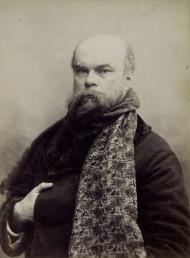누가 Arthur Rimbaud와 데이트 했나요?
Paul Verlaine 날짜가 Arthur Rimbaud 일 때 ?에서 ?. 까지 나이 차이는 10 년 6개월 20일 이었다.
Arthur Rimbaud

Jean Nicolas Arthur Rimbaud (Charleville, 20 de octubre de 1854-Marsella, 10 de noviembre de 1891), conocido como Arthur Rimbaud, fue un poeta francés simbolista, célebre por su poesía transgresiva y temáticas surreales que influyeron en la literatura y artes modernas como el decadentismo, la prefiguración del surrealismo y la generación beat. Fue considerado por el Nobel de Literatura Albert Camus como «el más grande de todos los poetas».
Nacido en Charleville, a los dieciséis años comenzó a escribir poemarios parnasionistas y luego simbolistas, que publicaba en diarios. Abandonó su hogar para ir a París en medio de la Guerra franco-prusiana y la crisis que afectaba a su país. Tuvo una desastrosa relación amorosa con el poeta simbolista francés Paul Verlaine, con quien después se fue a Inglaterra, donde vivieron pobremente. Volvió a Francia tiempo después, y de esta experiencia centró la única obra que publicó él mismo: Una temporada en el infierno.
Compuso la mayor parte de su producción literaria durante su adolescencia tardía y su edad adulta temprana. Dejó de escribir por completo a los veinte años, después de preparar Iluminaciones, poesía en prosa, a excepción de Marina y Movimiento, escritos en verso libre, que fue uno de los primeros europeos en usar junto con Jules Laforgue, Gustave Kahn y Stéphane Mallarmé.
Se convirtió al catolicismo y vio por última vez a Verlaine en 1875 en Alemania, cuando ya había dejado la literatura. Después de esto, siguió viajando por todo el continente europeo. En el verano de 1876, se enroló como soldado en el ejército colonial neerlandés para poder viajar a la isla de Java, y después desertar inmediatamente; volvió a Francia en barco. Luego viajó a Chipre, y en 1880 se radicó finalmente en Adén, Yemen, como empleado de cierta importancia en la compañía comercial fundada por Alfred Bardey.
En 1884 abandonó su trabajo y se transformó en comerciante por cuenta propia en Harrar, Etiopía, donde hizo una pequeña fortuna como traficante de armas.
Rimbaud falleció en Marsella el 10 de noviembre de 1891, después de volver a Europa a causa de un carcinoma en la rodilla derecha que había degenerado de una sinovitis, cuyo primer diagnóstico había sido artritis y cuyo primer tratamiento fue inútil.
더 알아보기...Paul Verlaine

Paul-Marie Verlaine ( vair-LEN; French: [pɔl maʁi vɛʁlɛn]; 30 March 1844 – 8 January 1896) was a French poet, writer and critic associated with the Symbolist, Parnassianist, and Decadent movements. He is considered one of the paramount exponents of the fin de siècle in French and international poetry.
Born in Metz to a petit-bourgeois family, Verlaine bore a lifelong interest in the arts, whether literary, musical or visual. His début collection, Poèmes saturniens (1866), were released at the age of twenty-two; they were published by Alphonse Lemerre. Verlaine's tempestuous sexual relationship with young poet Arthur Rimbaud (ten years his junior and under eighteen years, and while he himself had a wife and infant son), a member of the Zutistes, aroused great controversy; the couple peregrinated throughout England and Belgium until their split in 1873, which was caused by him wounding Rimbaud with a revolver. Following trial, Verlaine was sentenced to two years in prison for battery and sodomy. During his sentence, Verlaine reverted to practising Catholicism and composed Sagesse (published 1880), Jadis et naguère (published 1884) and Parallèlement (published 1889). As his reputation grew, he became increasingly haunted by guilt and paranoia, lapsing into depression, alcohol and chemical abuse and disease, culminating in his death in Paris from acute pneumonia.
Revered for his lyrical sensibility and subtle nuance, Verlaine is acknowledged as one of the archetypical poètes maudits ('accursed poets'), a turn-of-phrase he popularised but did not coin. His promise was evident even in his early work: his engagement with musicality, fluidity, wordplay, polysemy and prosodical manipulation attracted many admirers. His diverse œuvre is highly eclectic, exploiting the characteristics of the French language; critics have noted interplays with melancholy and 'chiaroscuro', as well as a pioneering of metaphor and allegory. Beyond his apparent elegance and mellifluity is a profound introspection, resonating with many contemporary artists of his time, including those outside the literary sphere (such as Impressionist painters).
Numerous composers, including Nadia Boulanger, Claude Debussy (Clair de lune inspired the third movement of his Suite bergamasque), Frederick Delius, Gabriel Fauré (Cinq Mélodies "de Venise" and La Bonne Chanson), Léo Ferré (his album Verlaine et Rimbaud), Reynaldo Hahn, Arthur Honegger, Sigfrid Karg-Elert, Charles Koechlin, Emmanuel Chabrier (two opéras-bouffes), Poldowski, Maurice Ravel, Jeanne Rivet, Kaikhosru Shapurji Sorabji, Igor Stravinsky, Louis Vierne and others, have set Verlaine's poetry to music, or used his body of work as inspiration for their compositions. Verlaine himself was aware of this and apparently pleased; he also wrote a few operatic libretti.
He was honoured with the title of Prince of Poets in 1894 following a referendum organised by Maurice Barrès consulting various people of letters.
더 알아보기...